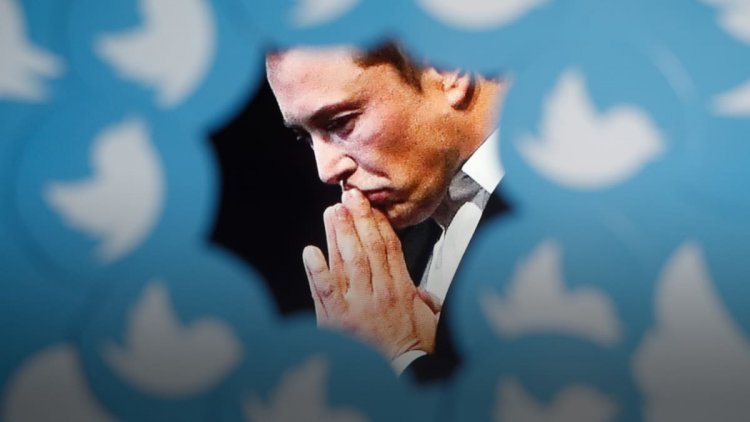Elon Musk Suffers a Huge Loss
Five months after buying Twitter for $44 billion, the billionaire estimates that the platform is worth just $20 billion.

Five months after buying Twitter for $44 billion, the billionaire estimates that the platform is worth just $20 billion.
Elon Musk's takeover of Twitter has been very eventful.
His reign at the head of the microblogging website is just as eventful.
The serial entrepreneur finalized the deal on Oct. 27, after a long battle with the management of Twitter 1.0, marked by multiple twists, threats, and public insults.
To top it off, the $44 billion purchase price paid by Musk was considered too high by analysts, who noted that the platform was not profitable and lagged behind its main rivals in terms of advertising revenue.
Musk had tried to renegotiate the price but his efforts ended in bitter failure. A little over five months after becoming the "Chief Twit" as he described himself, the billionaire has just slashed the valuation of the platform by more than half.
Twitter is now worth just $20 billion, Musk says, according to Platformer and The Information. This valuation is based on new equity grants to employees.
If that $20 billion valuation is less than half of what Musk had paid, it could in theory be a bargain for employees in case the company's valuation rebounds. Usually startups offer stock options at very low valuations to attract talent.
Twitter Could Worth $250 Billion
In an email sent to employees, the tech mogul is very optimistic about the future of the platform, for which he predicts a surge in valuation in the coming years.
"I see a clear, but difficult, path to a >$250B valuation," Musk wrote.
This means that new shares would be worth much more -- 10 times to be precise -- than their current value.
The decision to slash the valuation could therefore be a way for Musk to retain talent, but it also reflects the difficulties Twitter is going through.
Some of these problems were created by the billionaire himself. Musk decided to make Twitter the bastion of conservatives, by removing all safeguards limiting the spread of misinformation, racism, anti-Semitism and hate speech. This laissez-faire approach to content management has scared off many advertisers. Advertising revenue accounted for more than 91% of Twitter's revenue in the second quarter of 2022, the last period for which data is available.
Musk has taken the firm private, meaning that he no longer has to publicly announce the financial results.
The other decision Musk made was to drastically cut costs, which resulted in the departure of 5,200 employees in less than three months. Twitter employed 7,500 people when Musk arrived. He cut 50% of the jobs in one day last November.
A few days after these job cuts, the new owner of the social network asked the remaining employees to work long hours or leave.
"Going forward, to build a breakthrough Twitter 2.0 and succeed in an increasingly competitive world, we will need to be extremely hardcore. This will mean working long hours at high intensity. Only exceptional performance will constitute a passing grade," the billionaire wrote in an email sent to employees on Nov. 16.
"If you are sure that you want to be part of the new Twitter, please click yes on the link below," he continued. "Anyone who has not done so by 5pm ET tomorrow will receive three months of severance."
Liquidity Events
It is difficult to know what response the whimsical and visionary entrepreneur expected from this ultimatum. More than a thousand employees decided to leave, which caused general chaos, forcing Musk to temporarily close offices of Twitter, including the headquarters in San Francisco.
For the remaining employees, the question of compensation is one of the most important ones. In his email, Musk tells employees that new grants will vest over four years. The company also plans to offer cash-out opportunities to employees. Musk promises employees they can sell their stock holdings "every six months, based on a third party valuation" during "liquidity events."
It's a process the billionaire already uses at his rocket and satellite company SpaceX. The process "achieves the public company advantage of having a liquid stock, but without the stock price chaos and lawsuit burdens of a public company, Musk wrote.
SpaceX is privately held. Employees who hold shares can sell them within the windows provided by the company, which also determines the total number of shares that can be sold during these private offerings.
In the email to Twitter employees, Musk also urged them to view Twitter as an "inverse startup." He asserts that radical changes were necessary to avoid bankruptcy. He also repeated this message in a tweet in which he indicated that the company could be profitable in the second quarter.
"Titter was trending to lose ~$3B/year (revenue drop of ~$1.5B + debt servicing of ~$1.5B) and had $1B in cash, so only 4 months of money. Extremely dire situation," he posted on Mar. 25. "Now that advertisers are returning, it looks like we will break even in Q2."
Twitter responded with a poop emoji to a request for comment. Musk had recently indicated that this emoji will be the automatic response to media inquiries.
What's Your Reaction?

























































